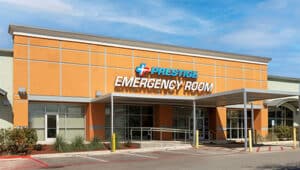Anxiety can feel overwhelming. If you’re experiencing symptoms that feel like too much to handle, visit the compassionate doctors at Prestige Emergency Room for prompt care and effective treatment.
We are available 24 hours a day, seven days a week, to help alleviate your worrisome symptoms or guide you through a serious mental health crisis.
What Is Anxiety?
Anxiety is an emotion characterized by feelings of tension, worried thoughts, and physical changes like high blood pressure. While it can be a normal response for people in risky situations or those who are under stress, it can also be a sign of an anxiety disorder.
Signs of Anxiety That May Feel Like a Medical Emergency
If you or a loved one is experiencing any of the symptoms below, especially if they are sudden, severe, or accompanied by pain that radiates down your arm or jaw, seek immediate medical attention—even if you think the pain is anxiety-related.
Chest Pain
Sharp, stabbing chest pain is often associated with anxiety, while a crushing pressure or squeezing sensation is more typical of a heart attack.
Shortness of Breath
Shortness of breath can be caused by anxiety or a medical emergency, depending on its severity and other symptoms. However, it should always be taken seriously. Whether you’re experiencing anxiety-related shortness of breath or think it is a medical emergency, visit your nearest Prestige ER location for prompt, accurate care.
Anxiety
- Shortness of breath with excessive worry and irritability.
- Shortness of breath following a stressful event.
- Shortness of breath alleviated by relaxation techniques (e.g., deep breathing, yoga, or walking).
Medical emergency
- Moderate to severe shortness of breath that begins suddenly.
- Shortness of breath with chest pain, lightheadedness, or changes in skin color.
- Shortness of breath with common heart attack symptoms (e.g., fatigue, nausea, vomiting, excessive sweating, or tightness in the chest, neck, jaw, or arm).
Heart Palpitations
Heart palpitations could be a sign of anxiety or a medical emergency. Visit your nearest emergency room for immediate attention if you experience one or more of the following symptoms:
- Chest pain lasting more than a few minutes.
- Dizziness, lightheadedness, or fainting.
- Shortness of breath.
- Sustained or repeated palpitations that appear without an anxiety-inducing cause.
- Difficulty breathing.
- Confusion.
- A family or medical history or heart problems.
- Palpitations that interfere with normal functioning.
Dizziness or Lightheadedness
While dizziness and lightheadedness can be symptoms of anxiety, they can also be cause for concern. If they are accompanied by one or more of the following, seek immediate medical attention:
- Sudden or severe dizziness.
- Chest pain (especially if it is prolonged).
- Difficulty speaking or understanding speech).
- Vision changes or double vision.
- Weakness or numbness on one side of the body.
- Confusion or sudden severe headache.
- Fainting or seizures.
Nausea and Stomach Pain
Mild nausea and stomach pain can be caused by anxiety and alleviated with relaxation techniques, stress management, and maintaining healthy lifestyle habits.
However, if the pain is severe or accompanied by other worrisome symptoms like vomiting blood, high fever, or severe abdominal cramping, seek immediate medical care in an emergency room.
Can You Visit an ER for Help With Anxiety?
Yes, you can absolutely visit an ER for an anxiety attack. Whether you’re experiencing severe symptoms or a mental health crisis, our medical teams are skilled in treating the symptoms of anxiety. If needed, we can also refer you to a mental health or behavioral specialist for compassionate, long-term treatment.
When To See a Doctor or Go to the ER About Anxiety
If you experience moderate to severe anxiety symptoms or uncontrollable panic episodes for 30 minutes or longer, visit your nearest emergency room for prompt medical attention and anxiety relief.
Also, if you experience sudden or intense mental, behavioral, or physical symptoms (e.g., thoughts of self-harm or harming others), difficulty breathing, chest pain, or hyperventilation, go directly to your nearest emergency room.
What Happens When You Go to the ER for Anxiety
When you go to the emergency room for an anxiety attack, you can expect to receive a psychiatric evaluation and treatment to help alleviate your symptoms. Treatments may include a check of your vital signs and medications to help relieve your anxiety. Your emergency room doctor may also prescribe anxiety medications and refer you to a trusted mental health professional.
Don’t Let Anxiety Take Over – Get Help at Prestige ER
If you are struggling with persistent or repeated episodes of anxiety or feel like your symptoms could be a medical emergency, visit your nearest Prestige ER location for a comprehensive evaluation and expert emergency room services.
All our locations are open 24 hours a day, seven days a week, to treat anxiety symptoms and so much more.












